French pronunciation: [ybɛʁʒozɛfwaltɛʁfʁɛʁɔʁbɑ̃] ; 24 April 1812 – 2 January 1896) was a Belgianliberal statesman.
Contents
Early life
He was born at Liège, received his education at home and in Paris, and began the practice of law in his native town. He identified himself with the Liberal party, and was conspicuous in the controversy with the Catholic clergy.
Career
In 1846, he wrote the program, which was accepted as the charter for a liberal political party. In 1847 he was elected to the Belgian Chamber and appointed Minister of Public Works. and from 1848 to 1852 he held the portfolio of Finance. He reduced postage, abolished the newspaper tax and was a strong advocate of free trade.
His work, La mainmorte et la charité (1854–57), directed against the Conservatives, produced a great effect on the position of parties in Belgium. As a result, in 1857, the Liberals returned to power and Frère-Orban became once more minister of Finance in the cabinet of Charles Rogier, whom he succeeded to become the prime minister in 1868. In 1870 the Catholics regained their supremacy and forced him to retire, but from 1878 to 1884 he was again at the head of the cabinet, most notably breaking off diplomatic relations with the Papal States in 1880 (which were restored in 1884).
As finance minister, Frère-Orban was instrumental in the creation of Belgium's three major public financial institutions, namely the National Bank of Belgium in 1850, [1] the Caisse Générale d'Épargne et de Retraite in 1850-1865, [2] and the Crédit Communal de Belgique in 1860. [3]
Standing as a liberal again in the October 1894 elections, he categorically refused the support of Catholics against progressives and socialists. He was not re-elected, defeated by the socialist Célestin Demblon.
Weakened by illness, he died on 2 January 1896. Frère-Orban lies in its birthplace, Liège, in the cemetery of Robermont.
Political philosophy
Frère-Orban's liberalism consisted in the assertion of the authority of the state over the church and the defense of the system of secular public instruction against the clergy. He was at all times opposed to the "undue extension" of suffrage. Among other works he wrote La question monétaire.
Honours
- National
 Belgium:
Belgium: - Minister of State, by Royal Decree. [4]
- 1881: Grand Cordon in the Order of Leopold (civil division). [5]
- Foreign
-

 Austria-Hungary: 1881: Knight Grand Cross in the Royal Hungarian Order of Saint Stephen. [6]
Austria-Hungary: 1881: Knight Grand Cross in the Royal Hungarian Order of Saint Stephen. [6]  Kingdom of France: Knight Grand Cross in the Legion of Honour. [7]
Kingdom of France: Knight Grand Cross in the Legion of Honour. [7]  Kingdom of Prussia: 6 May 1852: Knight 1st Class in the Order of the Red Eagle. [7] [8]
Kingdom of Prussia: 6 May 1852: Knight 1st Class in the Order of the Red Eagle. [7] [8]  Austrian Empire: Knight Grand Cross in the Imperial Order of Leopold of Austria [7]
Austrian Empire: Knight Grand Cross in the Imperial Order of Leopold of Austria [7]  Kingdom of Spain: Knight Grand Cross in the Order of Charles III. [7]
Kingdom of Spain: Knight Grand Cross in the Order of Charles III. [7]  Kingdom of Portugal: Knight Grand Cross in the Royal Military Order of Our Lord Jesus Christ. [7]
Kingdom of Portugal: Knight Grand Cross in the Royal Military Order of Our Lord Jesus Christ. [7]  Kingdom of Hanover: Knight Grand Cross in the Royal Guelphic Order. [7]
Kingdom of Hanover: Knight Grand Cross in the Royal Guelphic Order. [7]  Kingdom of Italy: Knight Grand Cross in the Order of Saints Maurice and Lazarus. [7]
Kingdom of Italy: Knight Grand Cross in the Order of Saints Maurice and Lazarus. [7]  Kingdom of the Netherlands: Knight Grand Cross in the Order of the Gold Lion of the House of Nassau. [7]
Kingdom of the Netherlands: Knight Grand Cross in the Order of the Gold Lion of the House of Nassau. [7]
See also
Related Research Articles
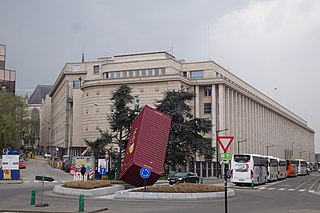
The National Bank of Belgium is the Belgian member of the Eurosystem. It was established by a law of 5 May 1850 and has been the monetary authority for Belgium from then until 1998, issuing the Belgian franc.
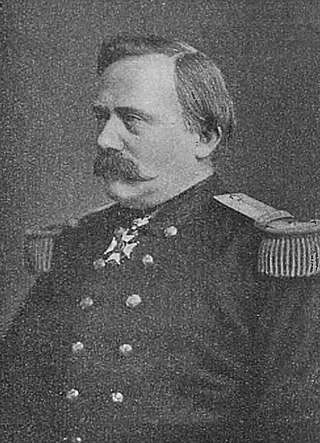
Henri-Alexis Brialmont, nicknamed The Belgian Vauban after the French military architect, was a Belgian army officer, politician and writer of the 19th century, best known as a military architect and designer of fortifications. Brialmont qualified as an officer in the Belgian army engineers in 1843 and quickly rose up the ranks. He served as a staff officer, and later was given command of the district of the key port of Antwerp. He finished his careers as Inspector-General of the Army. Brialmont was also an active pamphleteer and political campaigner and lobbied through his career for reform and expansion of the Belgian military and was also involved in the foundation of the Congo Free State.

Jean-Baptiste, Baron Nothomb was a Belgian statesman and diplomat, who served as the prime minister of Belgium from 1841 to 1845.
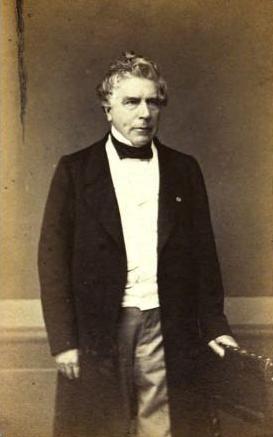
Charles Latour Rogier was a Belgian liberal statesman and a leader in the Belgian Revolution of 1830. He served as the prime minister of Belgium on two occasions: from 1847 to 1852, and again from 1857 to 1868.
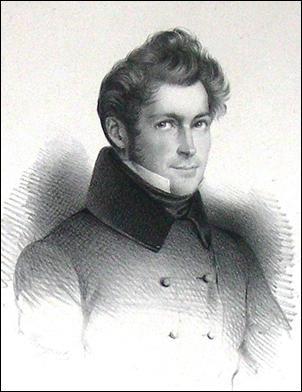
JonkheerHenri Ghislain Joseph Marie Hyacinthe de Brouckère was a Belgian nobleman and liberal politician. Born in Bruges, he was a magistrate and a professor at the Université Libre de Bruxelles. His brother Charles was mayor of Brussels.
The Liberal Party was a Belgian political party that existed from 1846 until 1961, when it became the Party for Freedom and Progress, Partij voor Vrijheid en Vooruitgang/Parti de la Liberté et du Progrès or PVV-PLP, under the leadership of Omer Vanaudenhove.

François Philippe Louis Hyacinthe Joseph de Haussy was a Belgian businessman, liberal politician and civil servant. He was Belgian minister of justice from 1847 until 1850.

Alexandre Marie Auguste Jamar was a Belgian businessman, liberal politician, and former governor of the National Bank of Belgium (NBB) from 1882 until 1888. From 1868 to 1870, he was the minister of public works in the government of Walthère Frère-Orban.

Jonathan-Raphaël Bischoffsheim was a Belgian banker, businessman and philanthropist.

Henri van Dievoet was a Belgian architect.
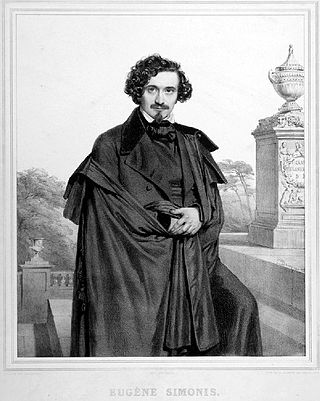
Louis-Eugène Simonis was a Belgian sculptor.

Senate elections were held in Belgium on 27 September 1851. The snap elections were called by Royal Order on 4 September, due to a lack of support among the wealthy senators for the introduction of an inheritance tax pushed for by the liberal Minister of Finance Walthère Frère-Orban.
The following lists events that happened during 1884 in the Kingdom of Belgium.
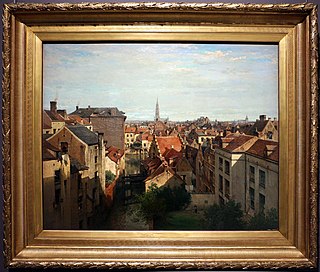
Events in the year 1868 in Belgium.
Events in the year 1870 in Belgium.
The following lists events that happened during 1880 in the Kingdom of Belgium.
The following lists events that happened during 1881 in the Kingdom of Belgium.
The following lists events that happened during 1878 in the Kingdom of Belgium.

The Algemene Spaar- en Lijfrentekas / Caisse générale d'épargne et de retraite was a major Belgian public bank, originally created in 1850 as a pension institution. It was acquired in stages between 1993 and 1998 by Fortis Group. In 1999 Fortis merged it with Générale de Banque and other operations to form Fortis Bank, which in turn was integrated from 2009 into BNP Paribas.

The Caisse Générale de Reports et de Dépôts was a bank headquartered in Brussels, Belgium. Founded in 1874, its business was reorganized in 1940 under the new name Banque de Reports et de Dépôts (BRD). It was eventually absorbed in 1953 by the Banque Lambert.
References
- ↑ Charles A. Conant (1910), The National Bank of Belgium (PDF), Washington DC: U.S. Senate - National Monetary Commission
- ↑ René Brion; Jean-Louis Moreau. "Inventaire des archives de la Caisse générale d'épargne et de retraite (CGER) 1850–2000" (PDF). BNP Paribas Fortis. BNP Paribas Historical Center & Association pour la Valorisation des Archives d’Entreprises asbl.
- ↑ Jacques Moden (1996), "La restructuration du Credit communal", Courrier Hebdomadaire du CRISP (1539), Brussels: Centre de recherche et d'information socio-politiques
- ↑ "FRÈRE". ars-moriendi.be.
- ↑ Handelsblad (Het) 11-06-1881
- ↑ Handelsblad (Het) 07-05-1881
- 1 2 3 4 5 6 7 8 Almanach royal officiel: 1875
- ↑ "Rother Adler-orden", Königlich Preussische Ordensliste (in German), vol. 1, Berlin, 1886, p. 29 – via hathitrust.org
{{citation}}: CS1 maint: location missing publisher (link)
Sources
- Liberal Archive
- This article incorporates text from a publication now in the public domain : Gilman, D. C.; Peck, H. T.; Colby, F. M., eds. (1905). New International Encyclopedia (1st ed.). New York: Dodd, Mead.
{{cite encyclopedia}}: Missing or empty|title=(help)
Walthère Frère-Orban | |
|---|---|
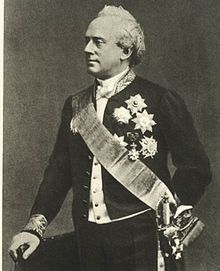 | |
| Prime Minister of Belgium | |
| In office 19 June 1878 –16 June 1884 |
